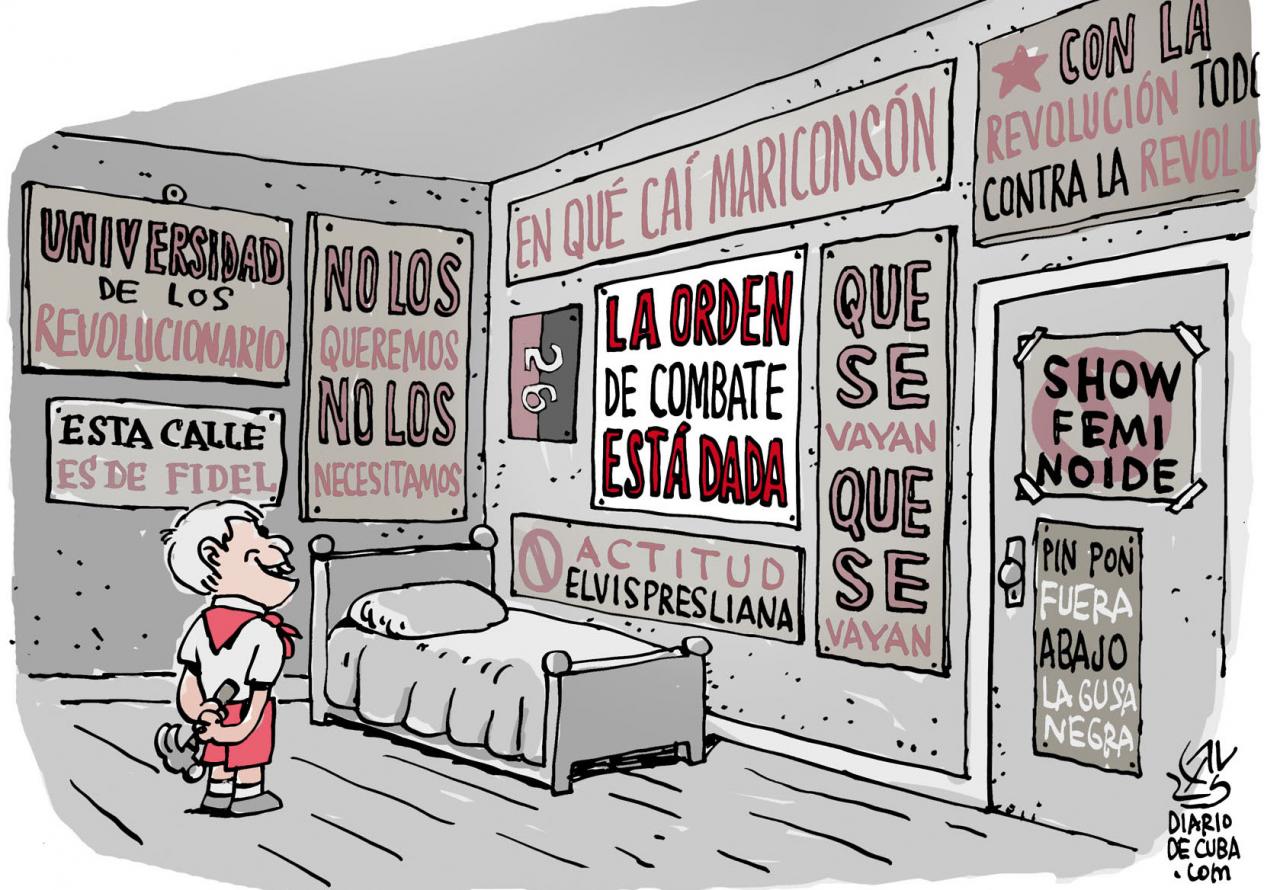We Cubans have heard, for a good part of our lives, the term "national security" as a mantra of the regime, generally preceding the announcement of the castration of some fundamental right, or of several, as is the case with Decree Law 35. National security seems to be the altar on which all rights may be sacrificed.
The second WHEREAS section of Decree-Law 35 states that the country requires "a higher-ranking legal regulation establishing the general legal framework governing telecommunications and information and communication technologies, in accordance with universal practice" to "safeguard the principles of security and the invulnerability of telecommunications for the benefit of the economy, society, Security and National Defense ...".
Many compatriots, even those who no longer believe in the regime's justifications of its curtailment of their freedoms, are unaware of the meaning and scope of this term. What exactly are we talking about when we speak of "national security?"
The regime would like us to associate national security with the prevention of an invasion by the United States, which the island's rulers seem to yearn for more than the Americans do.
In any case, though national security includes the prevention of threats or military attacks from other states through national defense mechanisms, the term encompasses more than this.
National security exists when people perceive the existence of material and spiritual guarantees, and when they feel that they are able to enjoy and exercise control over their rights and freedoms in the various spheres of national life: social, economic, cultural, political and legal.
National security is a concept that should serve, exclusively, the general interests of the population. It is the duty and goal of each State to protect a country's national security, which refers, mainly, to three aspects:
1. Territorial security, whose purpose is the protection of the nation's territory from invasion or illegal occupation or transit by other States or persons not authorized to enter the country.
2. The security of the population, referring to the protection of the community against situations that undermine their freedom, security or well-being.
3. The security of freedoms, which entails ensuring the observance of those freedoms recognized in the country's constitution.
The rulers of a country are public servants and, therefore, executors of the mandate that the people confer on them, hence the respect for and protection that they must provide to individual and political rights enshrined in any Constitution.
Article 54 of the Cuban Constitution recognizes "freedom of thought, conscience and expression." Decree Law-35, however, penalizes sharing news on social media that the Government considers false, offensive messages, or "defamation with an impact on the country's prestige."
Will they punish, then, those who have denounced or shared complaints about the country's overwhelmed hospitals (which Díaz-Canel himself had to acknowledge) for tarnishing Cuba's reputation as a "medical power," often touted by the regime?
Will it be punishable to publish or share on the networks the fact the Cuban State invests more in tourism than in public health, when the data published by its very own National Information and Statistics office (ONEI) recognizes this? Can a regime boast humanist prestige when it dedicates more resources to tourism, even if there are no tourists, than to the health of its citizens, in the midst of a pandemic?
Article 56 of Cuba's Constitution, for its part, recognizes the people's right to demonstrate for peaceful purposes. In fact, the president of the People's Supreme Court (TSP), Rubén Remigio Ferro stated in an appearance following the events of 11-J that demonstrating in Cuba, "far from constituting a crime, is a constitutional right of the people. Freedom of opinion, of the press, of belief, even political or ideological affiliation, does not constitute a crime."
Contradicting the TSP president's statements, Decree-Law 35 prohibits the convening of such demonstrations, despite the fact that they are a constitutional right, through the internet.
Depriving citizens of their right to urge the public powers "to carry out an act, or refrain from doing so," the regime forgets that these public powers are a mandate emanating from the people – or, at least they should be. But in Cuba, the public powers have not been elected by the people, but rather imposed on them. Thus, the regime views the security of its permanence in power as national security.
If the freedoms recognized in the Constitution form part of the spectrum of a country's national security, and the Government is restricting them to stay in power, it is the Cuban Government itself that is threatening national security.
There is no external threat that justifies the explicit restriction of rights found in Decree-Law 35. It has been made clear that, no matter how much the regime wishes it, there will be no US military intervention.
And it was not an external agent who called for a confrontation between Cubans, which could have sparked a civil war, but rather their president, Díaz-Canel. It was he who threatened Cuba's national security.
No external agent is blocking Cuban's access to the Internet, which they are paying for, and is one of the most expensive in the world; no foreign power prevented Cubans from freely accessing information or communicating with their families during and after the 11-J protests, and no foreign power is restricting economic freedoms at home, or preventing prosperity.
Cubans increasingly realize that the government needs to restrict too many freedoms in order to rule, and sense that if national security depends on citizens not being able to exercise their constitutional rights, something is very wrong.
But it is not enough to sense this. When listening to the government's mantra of national security, Cubans must also be aware that their own security is at stake. National security encompasses their constitutional rights and their individual freedoms, exercised for peaceful purposes. If the government threatens them, it threatens national security. And if a government threatens its country’s national security, constituting a direct threat to its citizens, that government must go.
